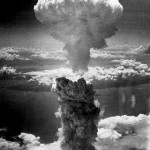I think I can count on my hands the number of times I have revisited a past post specifically to discuss a response to it, but my post on reassessing Iraq generated a great deal of email (very little of it the usual “hate” mail, which surprised me), and a few interesting blogger responses. Nate of The Lamb and Dragon blog took some issue with me, from a Catholic perspective and wondered if I have lost sight of the supernatural componants of this war:
If we fail to identify our enemies in a spiritual manner, and only see their material acts of violence, then our response with be on that material level and fail to address the underlying enemy – evil itself. For isn’t that what we are truly at war with – evil?
[…]
The Christ-like and Christian response to evil is merciful sacrifice – love to the end. We must entrust ourselves to this new form of divine warfare – a spiritual battle for the heart of mankind.
Back during the Great Big Benedict/Muslim Debacle of ’06, I wrote a piece for Pajamas Media on The Pope’s Supernatural Gambit and said therein:
“Let’s keep God out of this and talk as men,” has been the tactic of governments and nations for decades, and it has not worked. Ultimately it cannot work for the plain and simple reason that Islamists are not secular-thinking people living in what is thought of as a “natural” world. In fact, much of Islamic thinking – much of Islamic perspective – is utterly given over to the supernatural, to those things “seen and unseen.” And while governments “think as human beings,” Benedict, the Bishop of Rome, the man who sits on the Throne of Peter (whom Jesus advised to “think as God does,”) is perhaps uniquely qualified to deliver to these supernaturally-focused people something they cannot fail to understand, a supernatural challenge. And he does so while fully understanding that within the supernatural realm there are forces for the light, and for the darkness.
Clearly, I have been thinking not just materially but spiritually. I take Nate’s point, and “love, love, love” is certainly the perfect solution to any problem, but it is never an expedient one; we’re living in a reality that involves nuclear weapons, so expediency (at least in clearing away the underbrush of incessant Jihad so we can get to that “love” part) has some value, here.
In this case, I think I might take a line through Patrick O’ Hannigan, the eloquent Paragraph Farmer, when he makes an excellent paraphrase in Nate’s comments section: “military force is regrettably necessary in this case because it buys the time we need to wage successful ideological and spiritual campaigns against Islamic jihadism.”
Kevin from Counseling Kevin sent this bit of wisdom from G. K. Chesterton and his book, The Everlasting Man, in which Gilbert says it all so much better than I ever could. As usual.
“[A] man reading the Gospel sayings…would not find a word of all that obvious rhetoric against war which has filled countless books and odes and orations; not a word about the wickedness of war, the wastefulness of war, the appalling scale of the slaughter in war and all the rest of the familiar frenzy; indeed not a word about war at all. There is nothing that throws any particular light on Christ’s attitude toward organized warfare, except that he seems to have been rather fond of Roman soldiers.”
Writes Kevin: When discussing the power of Christ’s “use of the comparative in several degrees” (the “comparing of a lower thing to a higher and yet that higher with a higher still; of thinking on three planes all at once.”), Chesterton observes that this faculty is not one “that commonly belongs to these simplifiers of the Gospel; those who insist on what they call a simple morality and others call a sentimental morality. It is not at all covered by those who are content to tell everybody to remain at peace. On the contrary, there is a very striking example of it in the apparent inconsistency between Christ’s sayings about peace and about a sword. It is precisely this power which perceives that while a good peace is better than a good war, even a good war is better than a bad peace.”
As I wrote last week. No sane person wants war. But sometimes war comes. Islamofascist terrorism has been rising for the past thirty years and it shows no signs of abating. Inexorable evil needs an unambiguous – and unified – response.
UPDATE: Gerald has a more pragmatic take on things
I also got an email from a member of the military, D.R., and I am reprinting most of his email, because we can never hear too much from our soldiers:
Many of us in the military know about the political chatter swirling about. We just shrug and say, “what else is new.” The stakes in Iraq, Afghanistan, HOA, and elsewhere are enormous. We would rather fight here than in our own streets. And, this is the point many Americans do not believe will happen if we leave this fight early. They see this as an abstraction, or more as fear-mongering. It is not. The assumption that a “Minuteman” response would occur is like believing that a snowball won’t melt in 100-deg weather. The “Minuteman” response would not happen simply because of fear and the terrible loss of life we’ll see.
The terrorists we face over here are stone-cold killers. They would kill their own if it means they get to propagate their hate and evil. And, they are evil in every sense of the word. They are not misunderstood, they are not the misforgotten, etc. They do know who they are. Many terrorists come from a world of privilege, more privilege than many of their kinfolk.
President Bush has done his absolute best. He’s the right man for the time. This is not an easy war by any means a stretch of the imagination. We do put in very long days and very, very short nights. Sometimes we see very good results, sometimes the results aren’t so good. War by nature is very messy. While we do our best to plan for contingencies, we adjust accordingly. With regard to the Vice President and former SecDef Rumsfeld, they’ve been the best to us. They understand the stakes, and this is most important … not the political usefulness. You want people in leadership positions who understand the stakes, willing to make the hard decisions, and take responsibility regardless of the situation. The Vice President and Rumsfeld are such people. But, this is a point that can be argued at another time and by others.
For your son, keep him close. If he wants to join, encourage and support him. Military life can be difficult at times, but there’s no other experience that is better. If he wants to go another route, encourage and support him. Not everyone should see the face of war.
Thank you, D, and God bless you and your fellows.
Related: Reassessing Iraq, Just wars, etc











